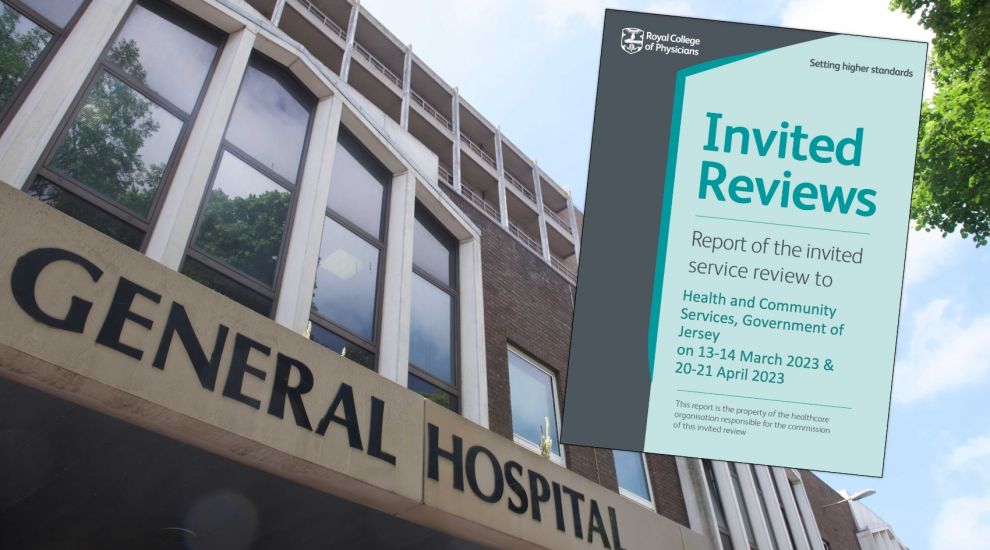


From "ever increasing workloads" to differing prescription guidelines to the UK and long MRI waiting lists, a new report has shed light on the circumstances that led hundreds of Jersey patients to be misdiagnosed and wrongly given powerful drugs.
Published today, the Royal College of Physicians' long-awaited review of Jersey's Rheumatology Department "found the standard of care to be well below what the review team would consider acceptable for a contemporary rheumatological service" and said that there was a "lack of governance, not just in rheumatology but across the healthcare organisation".
The review also noted that in some cases there was “no evidence of clinical examination” and there was “on occasions, an incorrect diagnosis”.
The Royal College of Physicians found that "a recurring theme was the lack of governance, not just in rheumatology but across the healthcare organisation".
The review was commissioned by Medical Director Patrick Armstrong following concerns raised in January 2022 by a junior doctor.
Following a recommendations from the Royal College of Physicians, the Health department also conducted an internal audit of rheumatology patient records earlier this year.
The audit involved checking the past treatment and diagnosis of a group of 341 rheumatology patients – all of whom who were prescribed a group of drugs known as ‘biologics’ in the period before January 2022.
Biologics are a group of powerful drugs derived from natural sources such as human, animal, fungal or microbial cells. These drugs work by suppressing the immune system and disrupting the inflammation process that leads to joint pain.
These drugs can be valuable for rheumatology patients, but should always be used with caution as they can also make patients more susceptible to life-threatening infections.
This audit has been completed and in over half the records reviewed, clinicians were not able to identify sufficient evidence to support the patient’s diagnosis.
Approximately one-in-four of the 341 patients reviewed had their biologic drugs discontinued because these drugs were not felt to be necessary.
The findings of this audit prompted HCS to widen its review to approximately 2,400 patients, including rheumatology patients on Disease Modifying Anti-Rheumatic Drugs (DMARDS) and non-rheumatology patients seen in recent years by the doctors leading the rheumatology service prior to January 2022.
Of more than a thousand patients on DMARDS, over 45% of diagnoses were changed and almost a third of patients have had their DMARDS stopped.

Pictured: Rheumatology deals with arthritis and several other conditions that affect the joints, tendons, muscle, ligaments.
In addition to incorrect diagnoses, the Royal College of Physicians' review team found no evidence of agreed pathways or standard operating procedures for most aspects of routine rheumatological care.
It was also noted that both public and private patients were being seen in the same clinics and there was no meaningful explanation of how this overlap of private and public patients was managed and planned.
The review team also raised concerns about the lack of built-in challenge to prescribing, particularly biologics, by the pharmacy team.
The review team heard from several interviewees about the reluctance to follow national or international guidance – such as National Institute for Health and Care Excellence or European League Against Rheumatism guidelines – as it "did not apply" in Jersey.
The review team was "concerned" to learn that alternative local policies to these guidelines did not exist in the island.
This lack of guidance meant that "an individual approach was taken whereby consultants were allowed to do their own research and make their own decisions on which medications they chose to provide to patients".

Pictured: The review team also raised concerns about the lack of built-in challenge to prescribing, particularly biologics, by the pharmacy team.
Concerns were also raised about the lack of requirement for prescriptions to include the clinical indications for treatment.
This meant that the pharmacy department had no checks in place to ensure compliance with guidance, nor was there challenge to advice given by consultants to patients on dosing.
The review raised concerns about staffing within the rheumatology department – which was being run by two doctors who were not on the specialist register for rheumatology.
Both of the rheumatology doctors involved in the review "alleged to have no job plans and ever-increasing workloads".
Job plans were requested for both consultant rheumatologists, however these were not provided to the review team.
One doctor – who was described as being "very patient-centred" and "a popular figure" – described his own practice as "old fashioned", with his prescribing practices being personally tailored towards patient’s lifestyles and his interpretation of the latest literature.
The other doctor – who has since left the island and now works for the NHS in Scotland – said that he found it difficult to challenge processes and decision making by leadership in the rheumatology service in Jersey.

Pictured: The review found that the rheumatology department was facing an ever-increasing workloads.
These two rheumatology consultants were being supported by one secretary, following the retirement of another, who was described as "overwhelmed".
The review also heard that "the nursing staff, who both worked only part time, complained of lack of physical capacity and increasing workload".
The review team also observed that many of the staff working in the service, including both medical and non-medical staff, "were not formally trained in rheumatology".
The review found that "their knowledge was self-taught, often taking it upon themselves to seek out education and training".
For specialist nurses, some of this training was provided by the pharmaceutical industry. The review team were "concerned about the relationship with the pharmaceutical industry in providing training and potential conflict of interests arising from the current arrangements".
The review also heard that "the nurses on multiple occasions reported to their managers about being understaffed with an increasing workload, but it was felt these requests went unheeded".
One of the doctors involved in the review outlined the "previous reassurance of input from an external Professor of Rheumatology which provided quality assurance and a second opinion for challenging cases and an opportunity to discuss the latest research".
However, it emerged that the professor had retired five years prior, and had never been replaced.
The review found that the notes of rheumatology patients mostly consisted of "limited, and often absent, handwritten evidence of the clinical interaction with the patients".
The review team described being "significantly concerned by the lack of documentation from clinics", with "a practice that was significantly outdated".
This included doctors keeping information in their heads or jotting down notes on bits of paper and then dictating a letter, following which the paper notes would be shredded.
The professional opinion for each case was documented in a typed letter, which were found to be "brief and generally uninformative" and "often failed to mention the diagnosis, rarely mentioned any relevant clinical findings and lacked therapeutic information, past or current".
Due to this, the review team "found it difficult to understand the clinical decision making".

Pictured: Rheumatology patient notes were made up of "limited, and often absent, handwritten evidence of the clinical interaction with the patients".
In interview, one of the rheumatology doctors explained that "there was no need to write within the patient notes, as they would be rarely referred to, and all the relevant information would reside within his head as he knew most patients well".
He also explained the brief letters were due to the "overwhelming stress" that the rheumatology secretary was under.
The other rheumatology doctor said that the lack of documentation was due the consultants in the service having a heavy clinical workload with no formalised job plans.
He agreed that the consultants would make a subconscious effort to keep clinic letters short to help limit the workload on the singular secretary who was supporting the department.
The review found that "all interviewees agreed that governance was lacking across the organisation".
The report outlined "no evidence of agreed pathways, nor standard operating procedures for most aspects of routine rheumatological care".
Indeed, many of the recommendations from the review focussed on the overall governance of the rheumatology department and the Health department more widely.
The review found that "the expected audits and benchmarking processes that would normally be associated with a contemporary rheumatological service were absent", and "interviews confirmed the lack of meaningful intelligence from clinicians and managers about even the most basic aspects of their service".
It was also found that "forums and opportunities for discussion of activity, risks learning and training were missing".
Pictured: The Royal College of Physicians found that "a recurring theme was the lack of governance, not just in rheumatology but across the healthcare organisation".
The review team also heard that the pharmacy attempted to conduct an audit on the medicines used within rheumatology, however, "there was reluctance from the clinicians to participate".
The Royal College of Physicians review team identified that prescribing within the rheumatology service was outside any of the national and international guidance available.
They found that "whilst it was acknowledged that there was no mandate to follow NICE guidance in Jersey, the review team thought it vital that there was evidence of standards or other guidance being followed".
The review also highlighted the lack of relevant musculoskeletal imaging – such as MRI or ultrasounds scans – in many cases to support a diagnosis.
However, rheumatology consultants explained that the lack of referrals for musculoskeletal imaging was a response to the long waiting times for patients.
The radiology service was described as "overwhelmed", with a 10 month wait for MRI scans and a six month wait for ultrasound scans.
Chris Bown, Chief Officer for Health and Community Services, also confirmed this morning that compensation was being discussed.
"We will be contacting any patient where we think harm may have been caused and we will be discussing with lawyers an appropriate approach to compensation," he said.
Last month, local law firm Viberts confirmed that it was acting for "multiple claimants" with potential clinical negligence claims against the Rheumatology Department – and that they may pursue a "potential class action" lawsuit, if more patients who were impacted come forward.
The Government declined to comment on this when approached by Express at the time.
This afternoon, Viberts confirmed that they had received enquiries from over 110 rheumatology patients, and are currently in the process of meeting with them all individually.
The law firm said that patients "have suffered a range of complications and side effects, from relatively minor to the most serious".
"For some, the impact on their lives has been devastating and irreversible," added Viberts.
It is unclear how much this compensation could amount to, but Express revealed last month that Treasury had set aside at least £1.3m to deal with what was described as a "rheumatology incident".
The Royal College of Physicians review team made several recommendations to help address the issues identified, key ones included:
£1.3m funding set aside to deal with 'rheumatology incident'
Health facing class action lawsuit over "inappropriate" prescribing
"Will there be a review into how communications were handled?"
New Rheumatology Head after review finds "inappropriate" prescribing
“Rheumatology patients deserve better” - records to be audited
Comments
Comments on this story express the views of the commentator only, not Bailiwick Publishing. We are unable to guarantee the accuracy of any of those comments.